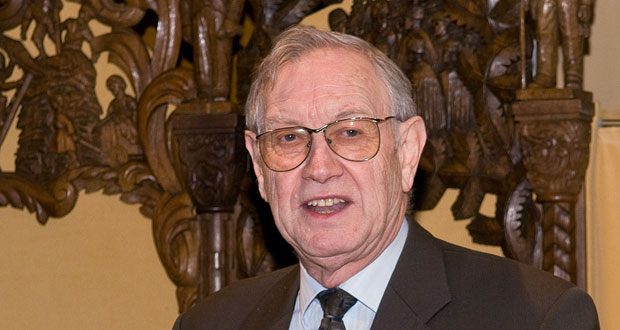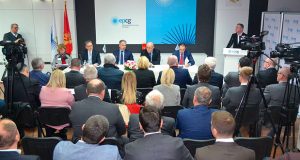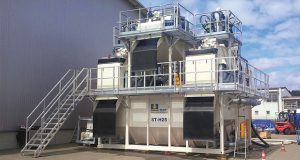Prof. (em.) Dr.-Ing. Dr.h.c. Walter Knissel died on 20th March 2018 in Bad Gandersheim at the age of 83. The sad news of his passing gives us cause to look back on his life, which was so closely linked to mining here in Germany and around the world.
He was born on 13th December 1934 in Landstuhl in the Palatinate region. The family moved to the Saarland in 1936 when his father was made Mayor of Homburg an der Saar. Just four years later in 1940, his father lost his life in the Second World War and so the family returned to the Palatinate after the war. In 1955, Walter Knissel completed his abitur leavers‘ exam at a grammar school in Kusel that specialised in the sciences. At a young age, he set his heart on studying mining, the turning point being a visit to the König an der Saar mine. And so, in the summer semester of 1956, after a year as a mining intern at the Upper Mining Authority in Bad Ems, he commenced his studies at the RWTH Aachen University, where he sat his final exams in 1961. He enjoyed his time at the university so much that in 1964 he went on to complete a doctorate of engineering, writing on the subject of “Theoretical and experimental investigation of the physical processes in pneumatic stowing lines.” The university awarded him the Borcher‘s Badge for his dissertation, which he wrote under the supervision of Professor Sann.
From 1965 to 1974, Walter Knissel worked at the Hückelhoven coal mine of the Sophia-Jacoba mining union in the Aachen region. His career progressed at tremendous speed; having started out in 1965 as a mechanisation engineer, by 1974 he was managing the mine.
From this role, he was appointed to the academic chair for “Mining processes in underground and surface mining” in 1974 as the successor to Professor Dr Günter Dorstewitz, and was at the same time named Director of the Institute of Mining Science and Mining Business Studies at Clausthal University of Technology (TU). From 1979 to 1993, Professor Knissel sat on many self-administrating academic committees. He was the Chairman of the Mining Department, Senator, Dean of the Faculty for Mining, Metallurgy and Mechanical Engineering, and from 1991 to 1993 he also served as chancellor and vice-chancellor of Clausthal TU. Professor Knissel retired after the winter semester of 2003/2004 and was granted an emeritus professorship.
Professor Knissel‘s contributions to science fill three books and 114 essays. His works on the Upper Harz Water Management System, now a recognised World Cultural Heritage site, are particularly worthy of praise. He supervised Gerhard Fleisch through his dissertation on the subject. His great passion for history also came to the fore in his role as Chairman of the History Committee at Clausthal TU from 1985 to 1992 and he was also involved in numerous other significant dissertations on mining history, including papers on Ilmenau copper slate (Kurt Steenbruck) and the Rammelsberg mine (Peter Eichhorn). Professor Knissel acted as primary supervisor on a total of 41 dissertations and secondary supervisor on a further 16.
The following awards and accolades were bestowed upon him for his far-reaching and international dedication to the field: The World Mining Congress Gold Medallion in Madrid in 1992, honorary professorship at Liaoning Technical University in China in 1993 and honorary membership of the International Organizing Committee of the World Mining Congresses. In 1992, he was awarded an honorary doctorate by the University of Miskolc in Hungary.
At the start of his studies in 1956, Walter Knissel joined the Saxonia-Berlin Corps fraternity in Aachen. From 1978, he was a member of the Academic Council for the Humboldt Society for Science, Art and Education. From 1976 to 1996, he was one of four German representatives on the International Organizing Committee of the World Mining Congress and in 1990 he became the founding member of the Society of Mining Professors. Though the society‘s roots date back as far as 1786, it shut down during the uncertain times of the Napoleonic Wars. It can be considered the first international society for engineering sciences.
In 1961, having successfully completed his exams, Walter Knissel married his wife, Annelie. They were married for 57 years. The death announcement read “The last word will be love”. Walter Knissel was a loving and compassionate husband and father of three.
As his student, doctoral tutee and later his colleague, I would like to add that Walter Knissel was a man of great sincerity who was friendly towards everyone, incapable of ill feeling and, above all, a man with a fantastic sense of humour. He had what it took to make students share his enthusiasm for his subject. Those he taught will never forget the sight of him waving his arms and walking from one side of the lecture theatre to the other as he explained the workings of a shearer loader.
I will always have the utmost respect for the life‘s work of Walter Knissel, and even more for the upstanding gentleman that he was. We owe him thanks for the lasting contributions he has made to science through his PhD students and he will live on in our memory. He was always ready with a joke and a smile, and that‘s precisely how we will remember him.
On behalf of the Institute for Mining and Clausthal
Oliver Langefeld



